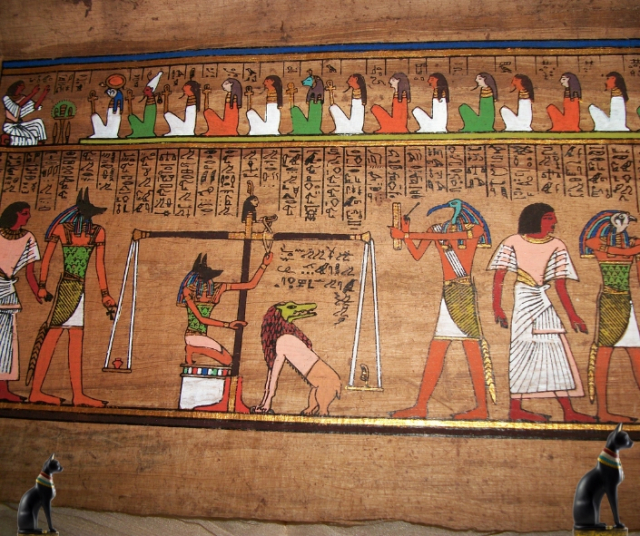Egyptian mythology is one of the richest and most complex of ancient times, with a vast collection of gods, goddesses, myths and rituals that have captured the imagination of people around the world for millennia. Throughout Ancient Egyptian history, these religious and mythological beliefs played a fundamental role in everyday life, culture, and society, shaping the way ancient Egyptians understood the world and their place in it. Join us on a journey through the mysteries and wonders of Egyptian mythology, exploring its gods, its myths, and its profound impact on the history and culture of ancient Egypt.
Origins and development of Egyptian mythology.
Egyptian mythology has its roots in the religious beliefs of the first civilizations that inhabited the Nile Valley more than five thousand years ago. These beliefs developed and evolved over time, giving rise to an elaborate system of gods and goddesses, myths and rituals that formed the core of Egyptian religion. From the early dynastic periods to the Greco-Roman era, Egyptian mythology underwent changes and transformations, but its basic elements remained constant throughout the millennia.
The gods and goddesses of the Egyptian pantheon.
The Egyptian pantheon is made up of a wide variety of gods and goddesses, each with their own specific personalities, attributes, and functions. Some of the most important gods include:
Ra: The god of the sun and one of the most revered in the Egyptian pantheon. He was represented as a man with the head of a falcon crowned by a solar disk.
Osiris: The god of life, death and resurrection, associated with the agricultural cycle of the Nile and life after death.
Isis: The goddess of motherhood, magic and protection, revered as the mother of Horus and wife of Osiris.
Horus: The god of the sky, war and royal protection, depicted as a falcon or a falcon-headed man.
Anubis: The god of death and mummification, responsible for guiding the souls of the deceased to the Afterlife and protecting their bodies in the tomb.
These are just a few examples of the numerous gods and goddesses that make up the Egyptian pantheon, each of whom played a crucial role in ancient Egyptian cosmology and religion.
Egyptian mythology and everyday life.
Egyptian mythology was not only a series of stories and religious beliefs, but was also integrated into all aspects of ancient Egyptian daily life and culture. From agriculture and architecture to politics and warfare, religious and mythological beliefs influenced every facet of Egyptian society. The pharaohs, as representatives of the gods on Earth, used religion to legitimize their rule and establish their authority over the Egyptian people. The temples dedicated to the gods were centers of religious, economic and social activity, where rituals, sacrifices and festivals were carried out in honor of the divinities. Furthermore, the belief in life after death and final judgment in the Hereafter had profound implications for the way Egyptians lived their lives and prepared for the afterlife.
Egyptian myths and legends.
Egyptian mythology is replete with a wide variety of myths and legends that explain the origin of the universe, the nature of the gods, and the destiny of humanity. These myths reflect the values, beliefs and concerns of Egyptian society and provide a fascinating window into their worldview and religion. Some of the most well-known myths include:
The creation myth, which tells how the sun god Ra emerged from primordial chaos and created the world and the gods from his own divine substance.
The myth of Osiris and his murder by his brother Seth, representing the cycle of life, death and resurrection in Egyptian nature and society.
The myth of Isis and Osiris, which tells how Isis, with the help of her sister Nephthys, resurrected Osiris and gave birth to his son Horus, who avenged his father's death and restored order to the world.
These are just a few examples of the numerous myths and legends that make up the rich tapestry of Egyptian mythology, each offering a unique insight into the worldview and spirituality of ancient Egypt.
Although the ancient Egyptian civilization disappeared thousands of years ago, its mythology and religion have left a lasting legacy that continues to fascinate people around the world to this day. Through literature, art, architecture, and popular culture, Egyptian mythology has influenced countless aspects of human society and continues to be a source of inspiration and awe in the modern era. By studying and appreciating Egyptian mythology, we can connect with the roots of human civilization and better understand our own history and spirituality. Egyptian mythology is more than a set of ancient stories; is a lasting testament to the imagination and ingenuity of the Egyptian people, who have left an indelible mark on the history and culture of the world.






